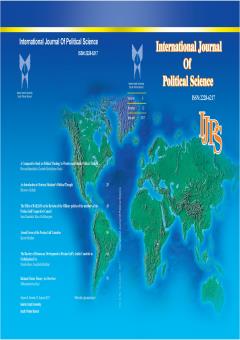From Identity Convergence to Social Divergence: A Study of the Inter-action of the Islamic Republic of Iran with Iraqi Shi’a Parties, 2003-2021
Subject Areas : علوم سیاسی
mohammad bagher hakim
1
![]() ,
Garineh Keshishyan Siraki
2
*
,
Garineh Keshishyan Siraki
2
*
![]() ,
Mohammadreza Ghaedi
3
,
Mohammadreza Ghaedi
3
![]()
1 - دانشجوی دکتری
2 - هیات علمی دانشگاه آزاد
3 - دانشیار دانشگاه آزاد شیراز
Keywords: Islamic Republic of Iran, Iraq's Shi’a parties, Constructivism, Realism, Foreign Policy, Convergence, Divergence,
Abstract :
The present study aims to identify and analyze the vulnerabilities, challenges, and consequences of the Islamic Republic of Iran's interaction with Iraq's Shi’a parties from 2003 to 2021. The theoreti-cal framework of the research is based on the constructivist approach, which enables a simultane-ous explanation of the role of political and religious identities, beliefs, and discourses in shaping the behavior of Iran and the Shi’a parties. This approach demonstrates that Iran's policies and sup-port were influenced by material and security interests and identity-based and structural interpreta-tions of Iraq's domestic and regional relations. The research method is quantitative-descriptive-analytical, with data collected through questionnaires distributed among Iranian and Iraqi political, cultural, and academic elites, and analyzed using descriptive and inferential statistical methods. The findings indicate that Iran's interactions with Iraq's Shi’a parties, within the framework of construc-tivism, contributed to consolidating the parties' positions, strengthening their identity and discur-sive cohesion, and fostering ideological alliances. However, in some cases, these interactions led to social divergence, increased internal divisions, and opened space for the influence of regional and extra-regional rivals. This analysis underscores that Iran's international behavior and policies can-not be understood solely through the lens of material interests, but must also be examined within the framework of Iraq's Shi’a identities, beliefs, and discourses. The study concludes by emphasiz-ing the necessity of adopting a balanced policy grounded in identity-based understanding and re-spect for Iraq's independence.
Alonso, G. (2007). Constructivism and In-ternational Relations: Identity, Sov-ereignty, and the Transformation of Political Space. London: Routledge.
Bashir, A. (2005). Discourse and Politics. Tehran: Ney Publications
Checkel, J. T. (1998). The Constructivist Turn in International Relations The-ory. World Politics, 50 (2), 324–348.
Dehghani Firoozabadi, S. J. (2008). Iranian Identity and Iran's Foreign Policy in the Middle East. Middle East Studies Quarterly, 12(3), 1–15.
Finnemore, M., & Sikkink, K. (2001). Tak-ing Stock: The Constructivist Re-search Program in International Re-lations and Comparative Politics. Annual Review of Political Science, 4, 391–416.
George, J. (1994). Discourses of Global Poli-tics: A Critical (Re)Introduction to International Relations. Boulder, CO: Lynne Rienner Publishers.
Hafeznia, M. (2002). Foundations of Politi-cal Geography. Tehran: SAMT Pub-lications.
Hopf, T. (1998). The Promise of Construc-tivism in International Relations Theory. Journal of International Se-curity, 23(1), 171–200.
Hopf, T. (2002). Social Construction of In-ternational Politics: Identities & Foreign Policies, Moscow, 1955 and 1999. Ithaca: Cornell University Press.
Karami, M. (2004). Identity and Foreign Pol-icy. Tehran: Strategic Research Cen-ter.
Kasraei, A., & Pouzesh Shirazi, M. (2009). Discourse Analysis in Iran's Foreign Policy. Tehran: Strategic Studies Re-search Institute.
Katzenstein, P. J. (1996). The Culture of National Security: Norms and Iden-tity in World Politics. New York: Columbia University Press.
Laclau, E., & Mouffe, C. (1985). Hegemony and Socialist Strategy: Towards a Radical Democratic Politics. Lon-don: Verso.
Lupovici, E. (2009). Constructivist Methods: A Plea and Manifesto for Pluralism, January 2009 Review of Internation-al Studies 35(01):195 – 218, DOI:10.1017/S0260210509008389
Mohammad Nia, M. (2012). Discourse and Identity in Iranian Foreign Policy: The Anti-Western Argument. Jour-nal of Middle Eastern Studies, 48(1), 27–50.
Moshirzadeh, H. (2007). International Rela-tions Theories. Tehran: SAMT Pub-lications.
Price, R., & Reus-Smit, C. (1998). Danger-ous Liaisons? Constructivism and Critical International Theory. Euro-pean Journal of International Rela-tions, 4(3), 259–294.
Reus-Smit, C. (2001). The Constitutive Role of Norms and Institutions in Inter-national Relations. In Social Con-structivism, eds. Johnstone and Kratochwil, 15–30. Cambridge: Cambridge University Press.
Reus-Smit, C. (2001). The Constitutive Role of Norms and Institutions in Inter-national Relations. In Social Con-structivism, eds. Johnstone and Kratochwil, 215–235. Cambridge: Cambridge University Press.
Sari' al-Qalam, M. (2000). Iran and Globali-zation: Challenges and Strategies. Tehran: Strategic Research Center.
Smith, M. (2000). Foreign Policy: Identity and Influence. Cambridge: Cam-bridge University Press.
Tajik, M. (1999). Foundations of Political Discourse. Tehran: SAMT Publica-tions.
Tajik, M., et al. (2003). The Transformation of Political Discourse in Iran. Teh-ran: Strategic Studies Research Insti-tute.
Torfing, J. (1999). New Theories of Dis-course: Laclau, Mouffe and Žižek. Oxford: Blackwell Publishers.
Wendt, A. (1992). Anarchy is What States Make of it: The Social Construction of Power Politics. International Or-ganization, 46(2), 391–425.
Wendt, A. (1994). Collective Identity For-mation and the International State. American Political Science Review, 88(2), 384–396.
Wendt, A. (1999). Social Theory of Interna-tional Politics. Cambridge: Cam-bridge University Press

